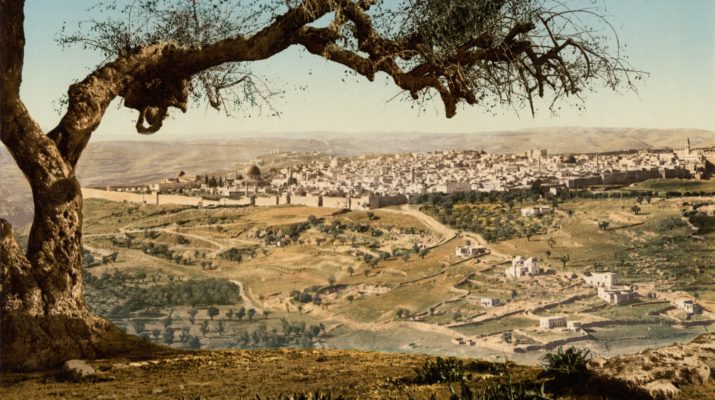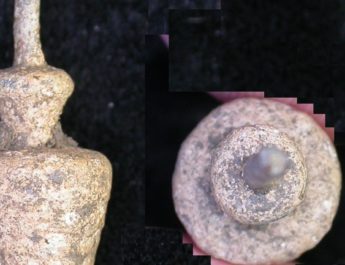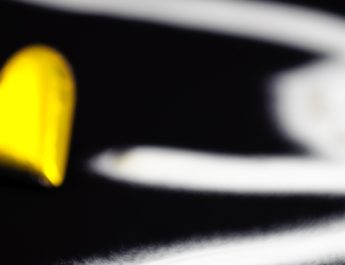Psalm 87
Of the Korahites.A A Psalm.B A Song.C
1 On the holyD mountE stands the city he founded;F
A “Korahites” = ben + Qorach. Literally, “children of Korah.” Ben is from banah (to build or obtain children). This is son, age, child. It is son in a literal or figurative sense. Qorach is from qarach (to shave bald, perhaps frozen). This is Korah, perhaps meaning “ice,” “frost,” “hail,” or “baldness.” See https://www.abarim-publications.com/Meaning/Korah.html
B “Psalm” = mizmor. From zamar (making music; used specially of music to worship God; music with singing, singing praise, singing psalms); may be from zamar (to trim or prune). This is a melody or a psalm.
C “Song” = shir. From shir (to sing; one who is singing or leading others in song). This is song, singer.
D “holy” = qodesh. This is set apart and so sacred. God is different from us and so God is holy/set apart. Things we dedicate to God’s service are set apart for God and so they, too, are holy, etc.
E “mount” = harar. 12x in OT. From the same as har (mountain, hill, hilly region). This is hill or mountain.
F “founded” = yesudah. 2x in OT. From yesud (foundation, beginning); from yasad (to establish, appoint, instruct; to set in a literal or figurative sense; also, to sit down together and so to consult or take counsel). This is foundation.
2 the LordG lovesH the gatesI of ZionJ
G “Lord” = YHVH. From havah (to be, become) or hayah (to come to pass, become, be). This is the name of the God of Israel, the self-existent and eternal one, the tetragrammaton. This pronunciation has been lost to time so “Lord” is generally used in its place.
H “loves” = aheb. This is to love, beloved, friend. It is to have affection for sexually or otherwise.
I “gates” = shaar. May be related to sha’ar (to calculate or reckon; may come from a root that means to open up or split). This is a gate, door, or other opening like a port.
J “Zion” = Tsiyyon. Related to tsyiyyun (signpost, monument); from tsavah (to charge someone, to command, order); from the same as tsiyyah (dryness drought); from a root meaning parched as desert, dry land. Zion can refer to a mountain in Jerusalem as well as another name for Jerusalem itself or the people.
more than allK the dwellingsL of Jacob.M
K “all” = kol. From kalal (to complete). This is all or every.
L “dwellings” = mishkan. From shakan (to settle down in the sense of residing somewhere or staying there permanently; to abide or continue). This is a place where one lives – a tabernacle, tent, or other kind of dwelling. It can also be a lair where animals live, the grave, the Temple, or the Tabernacle.
M “Jacob” = Yaaqob. From the same as aqeb (heel, hind part, hoof, rear guard of an army, one who lies in wait, usurper). This is Isaac’s son and his descendants. The name means heel-catcher or supplanter.
3 Glorious thingsN are spokenO of you,
O cityP of God.Q SelahR
N “glorious things” = kabad. To be heavy, weighty, or severe. It can also be positive abounding in, rich, or honorable. The Hebrew word for “glory,” kabod, is taken from this root.
O “spoken” = dabar. This is generally to speak, answer, declare, or command. It might mean to arrange and so to speak in a figurative sense as arranging words.
P “city” = iyr. From uwr (to awaken or wake oneself up). This can mean excitement in the sense of wakefulness or city. Properly, this is a place that is guarded. Guards kept schedules according to watches. This sense of the word would include cities as well as encampments or posts that were guarded.
Q “God” = Elohim.
R “Selah” = selah. From salal (to lift up, build, pile, extol, exalt; can also be used for opposing as a dam holds back water). This is to lift up or exalt. Also, “selah” in the psalms where its precise meaning is uncertain. It could be a pause in the music, a moment of silence. It could signal a change in the service or mean something akin to amen.
4 Among those who knowS me I mentionT RahabU and Babylon;V
S “know” = yada. This is to know, acknowledge, advise, answer, be aware, be acquainted with. Properly, this is to figure something out by seeing. It includes ideas of observation, recognition, and care about something. It can be used causatively for instruction, designation, and punishment.
T “mention” = zakar. This is to remember, to mark something so that it can be recalled, to be mindful of, to mention.
U “Rahab” = Rahab. 3x in OT. From rahab (to act arrogantly, storm, be bold, capture). This is Rahab, a name which means storm or boaster. It can refer to Egypt.
V “Babylon” = Babel. Perhaps from balal (to anoint, mix, overflow) OR from Akkadian Bbilim; perhaps from earlier Sumerian name Ca-dimirra (gate of god). This is Babylon or Babel. See https://en.wikipedia.org/wiki/Babylon.
WPhilistiaX too, and Tyre,Y with EthiopiaZ—
“This one was bornAA there,” they say.
W {untranslated} = hinneh. From hen (lo! Behold! If, though; an expression of surprise). This is to draw attention, show suddenness or surprise, or to emphasize the importance of the coming statement. See! Lo! Behold!
X “Philistia” = Peleshet. 8x in OT. From palash (to mourn, wallow, maybe roll in). This is Philistia, which may mean “griever” or “burrower” or “weakener.” See https://www.abarim-publications.com/Meaning/Philistine.html.
Y “Tyre” = Tsor. “From Phoenician “?? (ṣr /Ṣur/, “rock”)”” OR from the same as tsor (flint, stone, knife, edge); from the same as tsar (pebble, flint) or tsur (to confine, cramp, or bind in a literal or figurative sense; to besiege, assault, or distress). This is Tyre, the Phoenician city. Its name may mean “rock.” See https://en.wiktionary.org/wiki/Tyre
Z “Ethiopia” = Kush. Perhaps from Egyptia k’sh (Cush). This is Cush or his descendants. Also, Ethiopia – a place south of the Nile Valley. See https://en.wiktionary.org/wiki/%D7%9B%D7%95%D7%A9#Hebrew
AA “was born” = yalad. This is to bear or bring forth. It can mean to act as midwife or to show one’s lineage. This is often used for birth or begetting.
5 And of Zion it shall be said,
“This oneBB and that one were born in it”;
for the Most HighCC himself will establishDD it.
BB “one” = ish. Perhaps from enosh (human, humankind, mortal); from anash (to be weak, sick, or frail). This is man, husband, another, or humankind.
CC “Most High” = Elyon. From alah (to go up, ascend, be high, be a priority; to arise in a literal or figurative sense). This is most high, upper. It refers to elevation – so, lofty.
DD “establish” = kun. Properly, this means in a perpendicular position. So, it is set up in a literal sense – establish, fix, fasten, prepare. In a figurative sense, it is certainty, to be firm, faithfulness, render sure or prosperous.
6 The Lord records,EE as he registersFF the peoples,GG
“This one was born there.” Selah
EE “records” = saphar. From sepher (writing, document, book, evidence). This is properly to tally or record something. It can be enumerate, recount, number, celebrate, or declare.
FF “registers” = kathab. This is to inscribe, write, record, or decree.
GG “peoples” = am. From amam (to darken, hide, associate; creating shadows by huddling together). This is people or nation. It can be used specifically for a tribe, collectively of troops or armies, or figuratively to refer to a flock of animals.
7 SingersHH and dancersII alike say,
“All my springsJJ are in you.”
HH “singers” = shir. Related to “song” in superscript. See note C above.
II “dancers” = chalal. This is to pierce, which implies to wound. It is used figuratively for making someone or something profane or breaking your word. It can also mean to begin as though one opened a wedge. Also, to eat something as a common thing or to play the flute.
JJ “springs” = mayan. From ayin (eye, appearance; eye in a literal or figurative sense; a fountain). This is a spring, well, or fountain. Figuratively, this is a source of contentment.
Image credit: “Jerusalem from Mount Scopus, Holy Land, ca. 1895” – “Taken from the Detroit Publishing Co. Collection at the U.S. Library of Congress.”




